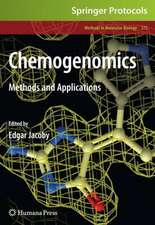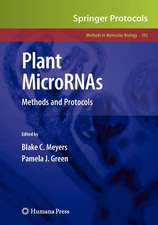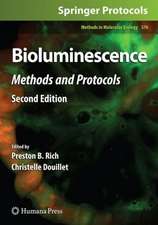Ion Channels: Methods and Protocols: Methods in Molecular Biology, cartea 337
Editat de James D. Stockand, Mark S. Shapiroen Limba Engleză Hardback – 17 apr 2006
| Toate formatele și edițiile | Preț | Express |
|---|---|---|
| Paperback (1) | 779.23 lei 38-44 zile | |
| Humana Press Inc. – 9 dec 2010 | 779.23 lei 38-44 zile | |
| Hardback (1) | 948.61 lei 43-57 zile | |
| Humana Press Inc. – 17 apr 2006 | 948.61 lei 43-57 zile |
Din seria Methods in Molecular Biology
- 9%
 Preț: 791.59 lei
Preț: 791.59 lei - 23%
 Preț: 598.56 lei
Preț: 598.56 lei - 20%
 Preț: 882.95 lei
Preț: 882.95 lei -
 Preț: 252.04 lei
Preț: 252.04 lei - 5%
 Preț: 802.69 lei
Preț: 802.69 lei - 5%
 Preț: 729.61 lei
Preț: 729.61 lei - 5%
 Preț: 731.43 lei
Preț: 731.43 lei - 5%
 Preț: 741.30 lei
Preț: 741.30 lei - 5%
 Preț: 747.16 lei
Preț: 747.16 lei - 15%
 Preț: 663.45 lei
Preț: 663.45 lei - 18%
 Preț: 1025.34 lei
Preț: 1025.34 lei - 5%
 Preț: 734.57 lei
Preț: 734.57 lei - 18%
 Preț: 914.20 lei
Preț: 914.20 lei - 15%
 Preț: 664.61 lei
Preț: 664.61 lei - 15%
 Preț: 654.12 lei
Preț: 654.12 lei - 18%
 Preț: 1414.74 lei
Preț: 1414.74 lei - 5%
 Preț: 742.60 lei
Preț: 742.60 lei - 20%
 Preț: 821.63 lei
Preț: 821.63 lei - 18%
 Preț: 972.30 lei
Preț: 972.30 lei - 15%
 Preț: 660.49 lei
Preț: 660.49 lei - 5%
 Preț: 738.41 lei
Preț: 738.41 lei - 18%
 Preț: 984.92 lei
Preț: 984.92 lei - 5%
 Preț: 733.29 lei
Preț: 733.29 lei -
 Preț: 392.58 lei
Preț: 392.58 lei - 5%
 Preț: 746.26 lei
Preț: 746.26 lei - 18%
 Preț: 962.66 lei
Preț: 962.66 lei - 23%
 Preț: 860.21 lei
Preț: 860.21 lei - 15%
 Preț: 652.64 lei
Preț: 652.64 lei - 5%
 Preț: 1055.50 lei
Preț: 1055.50 lei - 23%
 Preț: 883.85 lei
Preț: 883.85 lei - 19%
 Preț: 491.88 lei
Preț: 491.88 lei - 5%
 Preț: 1038.84 lei
Preț: 1038.84 lei - 5%
 Preț: 524.15 lei
Preț: 524.15 lei - 18%
 Preț: 2122.34 lei
Preț: 2122.34 lei - 5%
 Preț: 1299.23 lei
Preț: 1299.23 lei - 5%
 Preț: 1339.10 lei
Preț: 1339.10 lei - 18%
 Preț: 1390.26 lei
Preț: 1390.26 lei - 18%
 Preț: 1395.63 lei
Preț: 1395.63 lei - 18%
 Preț: 1129.65 lei
Preț: 1129.65 lei - 18%
 Preț: 1408.26 lei
Preț: 1408.26 lei - 18%
 Preț: 1124.92 lei
Preț: 1124.92 lei - 18%
 Preț: 966.27 lei
Preț: 966.27 lei - 5%
 Preț: 1299.99 lei
Preț: 1299.99 lei - 5%
 Preț: 1108.51 lei
Preț: 1108.51 lei - 5%
 Preț: 983.72 lei
Preț: 983.72 lei - 5%
 Preț: 728.16 lei
Preț: 728.16 lei - 18%
 Preț: 1118.62 lei
Preț: 1118.62 lei - 18%
 Preț: 955.25 lei
Preț: 955.25 lei - 5%
 Preț: 1035.60 lei
Preț: 1035.60 lei - 18%
 Preț: 1400.35 lei
Preț: 1400.35 lei
Preț: 948.61 lei
Preț vechi: 1156.84 lei
-18% Nou
Puncte Express: 1423
Preț estimativ în valută:
181.51€ • 190.03$ • 150.19£
181.51€ • 190.03$ • 150.19£
Carte tipărită la comandă
Livrare economică 07-21 aprilie
Preluare comenzi: 021 569.72.76
Specificații
ISBN-13: 9781588295767
ISBN-10: 1588295761
Pagini: 228
Ilustrații: XII, 216 p. 59 illus., 1 illus. in color.
Dimensiuni: 152 x 229 x 20 mm
Greutate: 0.54 kg
Ediția:2006
Editura: Humana Press Inc.
Colecția Humana
Seria Methods in Molecular Biology
Locul publicării:Totowa, NJ, United States
ISBN-10: 1588295761
Pagini: 228
Ilustrații: XII, 216 p. 59 illus., 1 illus. in color.
Dimensiuni: 152 x 229 x 20 mm
Greutate: 0.54 kg
Ediția:2006
Editura: Humana Press Inc.
Colecția Humana
Seria Methods in Molecular Biology
Locul publicării:Totowa, NJ, United States
Public țintă
ResearchCuprins
Methods for Exogenous Expression of Ion Channels in Cells.- Functional Reconstitution of the Human Epithelial Na+ Channel in a Mammalian Expression System.- Overexpression of Proteins in Neurons Using Replication-Deficient Virus.- Exogenous Expression of Proteins in Neurons Using the Biolistic Particle Delivery System.- Methods for Studying Channel Structure-function.- Tertiary and Quaternary Structure Formation of Voltage-Gated Potassium Channels.- Biophysical Approach to Determine the Subunit Stoichiometry of the Epithelial Sodium Channel Using the Xenopus laevis Oocyte Expression System.- Spectroscopy-Based Quantitative Fluorescence Resonance Energy Transfer Analysis.- Methods for Studying Channel Regulation and Physiological Function.- Probing the Effects of Phosphoinositides on Ion Channels.- Epithelial Sodium Channel in Planar Lipid Bilayers.- A Simple In Vivo Method for Assessing Changes of Membrane-Bound Ion Channel Density in Xenopus Oocytes.- Preparation of Cortical Brain Slices for Electrophysiological Recording.- Juxtacellular Labeling and Chemical Phenotyping of Extracellularly Recorded Neurons In Vivo.- Carbon Fiber Amperometry in the Study of Ion Channels and Secretion.- Methods for Studying Channelopathies, Genetic Screening, and Molecular Biology.- Genetic Screening for Functionality of Bacterial Potassium Channel Mutants Using K+ Uptake-Deficient Escherichia coli.- KCNQ1 K+ Channel—Mediated Cardiac Channelopathies.- Tissue-Specific Transgenic and Knockout Mice.
Textul de pe ultima copertă
It is now clear that ion channels play essential roles in cell biology and physiology and that their dysfunction is the root cause of many human diseases. In Ion Channels: Methods and Protocols, internationally recognized biomedical scientists describe recent technological breakthroughs and demonstrate their use in successful experimental designs. The diverse applications range from the study of allosteric regulation of ion channel activity using a classic mutagenesis approach, to the study of channel subunit stoichiometry using a novel biophysical approach based on fluorescence resonance energy transfer. Highlights include methods for heterologous expression of ion channels in cells, for determining channel structure-function, for studying channel regulation and physiological function, and for genetic screening and investigating channelopathies. The protocols follow the successful Methods in Molecular Biology™ series format, each offering step-by-step laboratory instructions, an introduction outlining the principles behind the technique, lists of the necessary equipment and reagents, and tips on troubleshooting and avoiding known pitfalls.
Comprehensive and highly practical, Ion Channels: Methods and Protocols offer both novice and experienced researchers a versatile collection of proven techniques for illuminating the structure, function, and regulation of ion channel proteins and finding suitable drug targets when they cause disease.
Comprehensive and highly practical, Ion Channels: Methods and Protocols offer both novice and experienced researchers a versatile collection of proven techniques for illuminating the structure, function, and regulation of ion channel proteins and finding suitable drug targets when they cause disease.
Caracteristici
Includes supplementary material: sn.pub/extras
















